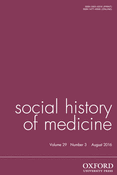-
Views
-
Cite
Cite
Susan Pickard, Sharon R. Kaufman, Ordinary Medicine: Extraordinary Treatments, Longer Lives, and Where to Draw the Line, Social History of Medicine, Volume 29, Issue 3, August 2016, Pages 666–667, https://doi.org/10.1093/shm/hkw048
Close - Share Icon Share
Extract
In this fascinating book Kaufman reflects on how a medicine that is both routine and high tech, in which implantable cardiac defibrillators, kidney dialysis, organ transplantation and aggressive cancer therapies are all standard treatments for older people, is profoundly shaping the experience and perceptions we have of old age. In the absence of any religious or publicly shared system of ethics, and in the context of an individualised society that makes health the responsibility (and burden) of the individual, it is through deliberations on treatment options that patients and their families find themselves confronting thorny existential questions. These include: what does it mean to age well? What embodied state constitutes ’health’ in one’s eighties and nineties? How much value do we give to ‘more time’ regardless of the quality of life involved? Should we cure the heart problem now only to accept the possibility of a future death from something potentially more distressing? The problem, for Kaufman, as for such analysts as Daniel Callahan and Thomas Cole, is that such choices arise in piecemeal fashion, through clinical decisions, rather than emergent from any coherent ethical system in which, for example, old age has a particular role and value in the context of a whole life, and different age groups are bound together in a measured form of reciprocity and obligation. Nor are they subject to democratic debate. This results in the peculiarly lonely experience of grappling with matters that were once not choices at all and for medicine ‘a new obligation to longevity’ (p. 39).




